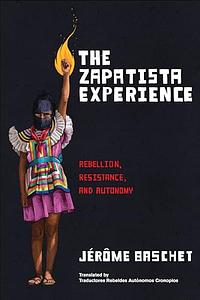Take a photo of a barcode or cover
challenging
hopeful
informative
inspiring
slow-paced
I must admit that I've been a bad anarchist ™. While I've read many references to the Zapatista movement, I've never spent a ton of time really learning about them in detail. The Zapatista Experience was a much needed and enjoyable remedy to that situation. I can truly see now why do many leftists of many stripes look up to the Zapatistas as a functioning movement and liberatory society in practice. (I should note that they don't specifically identify as an anarchist movement, but share much overlap in philosophy.)
The translation of Jérôme Baschet's text by Traductores Rebeldes Autónomos Cronopios is skillful and readable. This and the text's introduction explaining foundations of the Zapatista movement make this book accessible to a wide audience. My book is completely littered with page flags. It's highly quotable. While there is an academic nature to the text, it is not the kind of excessively wordy type meant only to be understood by a tiny PhD minority.
I really enjoyed learning about just how far reaching and revolutionary the beliefs of the Zapatistas are and continue to be today. They offer a real example of successful autonomy and resistance rather than only theory, flawed/unsuccessful/hierarchical revolution, or state solutions to problems. Baschet did well discussing the many strengths of their practices and also the limitations and difficulties implementing such things. For instance, there is a lot of discussion around inescapable finances despite the fight against capitalism, which is something often neglected in revolutionary struggle (and as a result can cause a movement to fall into authoritarian structure.) Also, the discussions of autonomous vs "official" justice provides solutions to the common question thrown at as: What about the (murderers/abusers/etc)?
Another strength of Zapatista movements is the focus on dignity, joy, and humor. A cooperative society must include these things and organized effectively, leaves far more room for them than capitalist and authoritarian culture. The use of metaphor (the hydra, storm, and crack) in theoretical discussion was also very interesting.
There are in depth discussions of the Zapatista view on various forms of identity politics such as indigenous/mestizo participation and gendered oppression. There is regular emphasis on cooperation across lines of identity and experience rather than creating binaries. The Zapatisas acknowledge that we cannot return to a precolonial era and must find liberatory ways that allow cooperation across power differentials. The only thing I was left frustrated with here is how little I learned about women in the movement. Almost all quotes are from men. While I understand that they did have spokespeople and thus the most available quotes may come from them, there were also women speaking out that I did not get to hear from aside from abstract references to women's liberation.
I was fascinated by the discussion of how the other-than-human world played into their philosophies. There was discussion of the "anthropocene" being problematically human centered, but they used the term "capitalocene" to explain how capitalism is linked to and exacerbates this process. There is also discussion of both respect for and moving beyond indigenous tradition. There is emphasis on more modern benefits of certain societies, particularly environmental sciences. Rather than a war between "the West" and indigenous and other societies, there is a push for cooperation, taking the best parts of each. Indigenous Zapatistas discuss both the importance of preserving AND not being tied down by traditions.
All of these things are wrapped up inside the oft quoted Zapatista foundation: a world in which many worlds fit. I thoroughly enjoyed getting to know more about the ins and outs of this movement. The Zapatista Experience is a well written and skillfully translated volume that makes this important information accessible, and inspiring, to a wider audience.
This was also posted to my blog and goodreads.
The translation of Jérôme Baschet's text by Traductores Rebeldes Autónomos Cronopios is skillful and readable. This and the text's introduction explaining foundations of the Zapatista movement make this book accessible to a wide audience. My book is completely littered with page flags. It's highly quotable. While there is an academic nature to the text, it is not the kind of excessively wordy type meant only to be understood by a tiny PhD minority.
I really enjoyed learning about just how far reaching and revolutionary the beliefs of the Zapatistas are and continue to be today. They offer a real example of successful autonomy and resistance rather than only theory, flawed/unsuccessful/hierarchical revolution, or state solutions to problems. Baschet did well discussing the many strengths of their practices and also the limitations and difficulties implementing such things. For instance, there is a lot of discussion around inescapable finances despite the fight against capitalism, which is something often neglected in revolutionary struggle (and as a result can cause a movement to fall into authoritarian structure.) Also, the discussions of autonomous vs "official" justice provides solutions to the common question thrown at as: What about the (murderers/abusers/etc)?
Another strength of Zapatista movements is the focus on dignity, joy, and humor. A cooperative society must include these things and organized effectively, leaves far more room for them than capitalist and authoritarian culture. The use of metaphor (the hydra, storm, and crack) in theoretical discussion was also very interesting.
There are in depth discussions of the Zapatista view on various forms of identity politics such as indigenous/mestizo participation and gendered oppression. There is regular emphasis on cooperation across lines of identity and experience rather than creating binaries. The Zapatisas acknowledge that we cannot return to a precolonial era and must find liberatory ways that allow cooperation across power differentials. The only thing I was left frustrated with here is how little I learned about women in the movement. Almost all quotes are from men. While I understand that they did have spokespeople and thus the most available quotes may come from them, there were also women speaking out that I did not get to hear from aside from abstract references to women's liberation.
I was fascinated by the discussion of how the other-than-human world played into their philosophies. There was discussion of the "anthropocene" being problematically human centered, but they used the term "capitalocene" to explain how capitalism is linked to and exacerbates this process. There is also discussion of both respect for and moving beyond indigenous tradition. There is emphasis on more modern benefits of certain societies, particularly environmental sciences. Rather than a war between "the West" and indigenous and other societies, there is a push for cooperation, taking the best parts of each. Indigenous Zapatistas discuss both the importance of preserving AND not being tied down by traditions.
All of these things are wrapped up inside the oft quoted Zapatista foundation: a world in which many worlds fit. I thoroughly enjoyed getting to know more about the ins and outs of this movement. The Zapatista Experience is a well written and skillfully translated volume that makes this important information accessible, and inspiring, to a wider audience.
This was also posted to my blog and goodreads.

